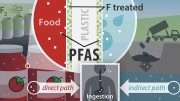
PFAS (Per- and Polyfluoroalkyl Substances) are a group of synthetic chemicals used in a variety of products due to their water and oil-resistant properties. They are commonly found in non-stick cookware, waterproof clothing, and fire-fighting foams. PFAS can persist in the environment for a long time and have been linked to various health problems, including cancer, thyroid disorders, and developmental issues.
For the first time, researchers from the University of Toronto, Indiana University, and the University of Notre Dame have discovered the presence of harmful PFAS chemicals in Canadian fast-food packaging. These chemicals, known as per- and polyfluoroalkyl substances, have been found in water-and-grease repellent paper alternatives to plastic.
The study, published in the journal Environmental Science and Technology Letters, reveals that food packaging can expose people to PFAS, chemicals associated with severe health impacts such as elevated cancer risk and harm to the immune system, through contamination of the food we consume. Additionally, when disposed of, packaging introduces PFAS into the environment, where these persistent substances never degrade. In response to the health and ecological hazards, 11 U.S. states have prohibited PFAS in the majority of food packaging, and two leading restaurant chains have pledged to eliminate PFAS from their operations by 2025.
“As Canada restricts single-use plastics in food-service ware, our research shows that what we like to think of as the better alternatives, such as paper wrappers and compostable bowls, are not so safe and ‘green’ after all. In fact, they may harm our health and the environment—from our air to our drinking water—by providing a direct route to PFAS exposure,” says Miriam Diamond, professor in the Department of Earth Sciences and School of the Environment at the University of Toronto and study co-author.
For the study, the researchers collected 42 paper-based wrappers and bowls from fast-food restaurants in Toronto and tested them for total fluorine, an indicator of PFAS. They then completed a detailed analysis of eight of those samples with high levels of total fluorine. Fibre-based moulded bowls, which are marketed as “compostable”, had PFAS levels three to 10 times higher than doughnut and pastry bags. PFAS are added to these bowls and bags as a water- and grease-repellent.
PFAS are a complex group of about 9,000 manufactured chemicals, few of which have been studied for their toxicity. A PFAS that is known to be toxic—6:2 FTOH (6:2 fluorotelomer alcohol)—was the most abundant compound detected in these samples. Other PFAS that were commonly found in all the Canadian fast-food packaging tested can transform into this compound, thereby adding to a consumer’s exposure to it. They detected several PFAS for the first time in food packaging, showing how difficult it is to track the presence of this large family of compounds.
Critically, the researchers found that the concentration of PFAS declined by up to 85 per cent after storing the products for two years, contradicting claims that polymeric PFAS—a type composed of larger molecules—do not degrade and escape from products. The release of PFAS from food packaging into indoor air presents another opportunity for human exposure to these chemicals.
“The use of PFAS in food packaging is a regrettable substitution of trading one harmful option—single-use plastics—for another. We need to strengthen regulations and push for the use of fibre-based food packaging that doesn’t contain PFAS,” says Diamond.
Reference: “Per- and Polyfluoroalkyl Substances in Canadian Fast Food Packaging” by Heather Schwartz-Narbonne, Chunjie Xia, Anna Shalin, Heather D. Whitehead, Diwen Yang, Graham F. Peaslee, Zhanyun Wang, Yan Wu, Hui Peng, Arlene Blum, Marta Venier and Miriam L. Diamond, 28 March 2023, Environmental Science & Technology Letters.
DOI: 10.1021/acs.estlett.2c00926
The study was funded by Environment and Climate Change Canada, the Great Lakes Protection Initiative, the Natural Sciences and Engineering Research Council of Canada, the Green Science Policy Institute, and the European Union under the Horizon 2020 Research and Innovation Programme.









Ummm, repost of your recent article?
https://scitechdaily.com/thought-to-be-safe-replacement-pfas-used-in-food-packaging-are-actually-hazardous